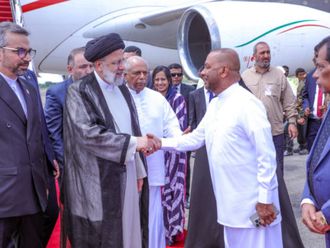Beirut: Lebanese Shiite group Hezbollah has detained one of its own operatives who has confessed to spying for Israel, its leader Sayyed Hassan Nasrallah acknowledged for the first time on Thursday, in a case that has shattered the group’s aura of impenetrability.
Local media reported the arrest several weeks ago, describing the man as an officer overseeing foreign operations, but Hezbollah had previously declined to comment.
Nasrallah told Beirut-based Al Mayadeen TV that the man was detained five months ago and had confessed to working for Israel’s intelligence service, Mossad. He said the arrest demonstrated Hezbollah’s vigilance in its 32 years of struggle against the Israeli regime.
“For me this is a breach and should not happen but if it happens then it is part of the battle, it is part of the war between us and Israel,” he said.
Hezbollah, which fought a 34-day war with the Israelis in 2006, has vowed to retaliate against its foe for the assassination of its military commander Emad Moughniyeh in a car bomb in Damascus the following year. So far, however, it has not succeeded.
Nasrallah did not give the name of the spy and played down his importance, saying he was a member of a security unit but not a commander or deputy.
“He was detained five months ago and he confessed about all the information he has given [to the Israelis] and the extent of his cooperation,” he said.
Shock waves
Reports of the arrest sent shock waves through the group, whose supporters have always boasted it could not be infiltrated.
“This is considered one of the most dangerous breaches in the ranks of Hezbollah, which operates in a secretive manner, but it will not pose any threat to the group,” a senior Lebanese official said.
Israeli officials declined to comment. But Yaakov Amidror, a retired general with Israeli military intelligence, said the detention showed that Hezbollah’s image “of impenetrability is not founded in fact.”
“What I can say is that Hezbollah is a major enemy of Israel, and if indeed Israel managed to penetrate Hezbollah’s apparatus so deeply, then that should give Hezbollah pause,” he said.
Several sources, some close to the group, identified the alleged spy as Mohammad Shawraba. They said he joined Hezbollah at a young age, in the early days of its creation, and took part in several attacks against Israeli soldiers in Lebanon before they withdrew from the country in 2000.
The sources said he established contact with Mossad as a form of retaliation because he was frustrated at not being promoted.
“He is a wealthy businessman and travels between Spain and Italy. He worked for the Mossad for several years and played a role in foiling attempts to get revenge for Moughniyeh, and he exposed several people who were planning to avenge his death,” the Lebanese official said.
Hezbollah functions as a political party that is part of the Lebanese government. It also has a military wing that has sent hundreds of fighters to support President Bashar Al Assad’s forces in the civil war in neighbouring Syria.
Nasrallah also threatened to retaliate against Israel for repeated strikes on Syria and said he has had Iranian Fateh-110 missiles that could strike throughout Israel since 2006, adding that it is always ready to fight the regime.
He said that Israeli strikes on Syria “target the whole of the resistance axis”, which includes Hezbollah, Damascus and Tehran.
“The repeated bombings that struck several targets in Syria are a major violation, and we consider that any strike against Syria is a strike against the whole of the resistance axis, not just against Syria,” he said.
“The axis is capable of responding. This can happen any time.”
Asked about Hezbollah’s arsenal, Nasrallah said the group had “all [the weapons] you can imagine... and in great quantities”.
He added: “We are now stronger than we ever were as a resistance movement.”
According to Pentagon officials, Hezbollah has 50,000 missiles, including some capable of reaching Tel Aviv.
The Israeli air force has carried out several raids against targets in Syria, including depots storing weapons meant for Hezbollah, since the conflict there started nearly four years ago.
Nasrallah said in the interview that Hezbollah is ready to fight a new war against the Israeli regime in Lebanon and renewed a threat to invade the Galilee region in the north of the country.
“When the resistance [Hezbollah] leadership... asks you [fighters]... to enter into Galilee, that means the resistance must be ready to enter into Galilee and to go even beyond the Galilee.”












